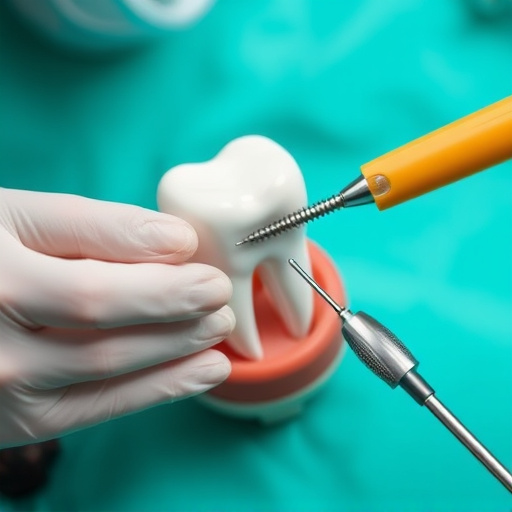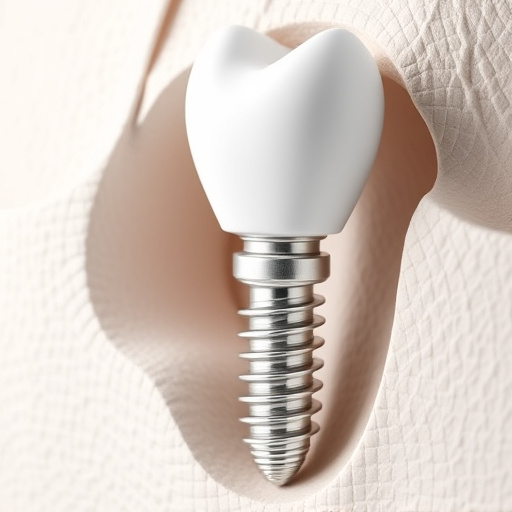Dental anxiety, a common phobia, causes individuals to feel frightened or nervous during dental appointments, with symptoms ranging from mild discomfort to panic attacks. Treatment involves understanding and addressing underlying causes such as negative past experiences, fear of pain, lack of control, or genetic predisposition. Building trust through warm greetings, clear explanations, and personalized care plans is crucial for patient comfort. Cognitive-behavioral therapy (CBT) helps patients gradually confront feared dental situations, and medication or anaesthesia can alleviate severe discomfort. Cosmetic dentistry and dental implants can further enhance patient confidence by addressing functional and aesthetic concerns.
Dental anxiety is a common challenge, affecting millions with fears ranging from mild discomfort to severe panic. This article explores effective dental anxiety treatment strategies, focusing on building trust between patients and dental professionals. We delve into the symptoms and causes behind this phobia, offering insights that can help both sufferers and practitioners. Additionally, we present practical, proven techniques for creating a calming environment and fostering confidence in dental care, ultimately improving patient experiences and outcomes.
- Understanding Dental Anxiety: Symptoms and Causes
- Building Trust: Effective Strategies for Dental Practices
- Overcoming Dental Phobias: Treatment Options and Patient Support
Understanding Dental Anxiety: Symptoms and Causes

Dental anxiety is a common phobia characterized by feelings of fear, nervousness, or avoidance when facing dental treatments and procedures. It can manifest in various ways, from mild discomfort to intense panic attacks. Symptoms may include rapid heartbeat, sweating, trembling, and difficulty breathing during dental appointments. Understanding the causes behind dental anxiety is crucial for effective treatment.
Several factors contribute to its development, including negative past experiences, fear of pain or needles, lack of control over procedures, and even genetic predisposition. For some, traumatic events in childhood or severe dental issues in the past can trigger lasting anxiety. In others, general anxiety disorders or a sensitivity to sensory inputs may play a role. Restorative dentistry and general dentistry practices often encounter patients with dental anxiety, and addressing it is key to ensuring patient comfort and successful treatments, even considering options like dental bonding for specific procedures.
Building Trust: Effective Strategies for Dental Practices

Building trust is a cornerstone for successful dental anxiety treatment. Dental practices that prioritize patient comfort and communication establish a supportive environment, easing fears and fostering trust. Simple yet powerful strategies include greeting patients warmly, explaining procedures in plain language, and allowing questions. A calm, friendly dental team can significantly reduce anxiety, making routine oral exams more manageable.
Comprehensive dental care goes hand in hand with trust-building. Practices offering diverse services, from preventive care to advanced treatments like dental implants, demonstrate expertise and reliability. When patients see their trusted dentist managing various dental needs, it reinforces the perception of safety and competence. Regular check-ins and personalized care plans further strengthen this bond, turning routine visits into opportunities for open dialogue and mutual trust.
Overcoming Dental Phobias: Treatment Options and Patient Support

Overcoming dental phobias is a significant aspect of dental anxiety treatment. Patients with intense fear or phobia of dentists often avoid necessary oral care, leading to poor oral health and increased anxiety. Treatment options include cognitive-behavioural therapy (CBT), which helps patients gradually expose themselves to dental situations they fear, coupled with relaxation techniques to manage anxiety. In severe cases, medication or anaesthesia might be used during procedures to reduce discomfort and stress.
Support from healthcare professionals plays a crucial role in helping patients overcome their phobias. Dentists and therapists can offer tailored strategies, such as explaining procedures clearly, providing positive reinforcement, and personalizing treatment plans. Additionally, discussing fears openly allows for the development of trust, which is essential for successful dental anxiety treatment. Incorporating cosmetic dentistry or considering dental implants might further enhance a patient’s experience by addressing both functional and aesthetic concerns, thereby fostering confidence in their oral care journey.
Dental anxiety can significantly impact an individual’s oral health and overall well-being, but with the right strategies, it is treatable. By implementing trust-building techniques in dental practices, healthcare professionals can create a more comforting environment, addressing the root causes of anxiety. This comprehensive approach, combined with various treatment options and patient support, empowers individuals to overcome their dental phobias and take control of their oral health journey. Through understanding and effective management, dental anxiety treatment can lead to improved patient experiences and better overall dental care.














